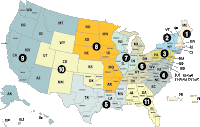In St. Johns River Water Management District v. Koontz (SC09-713), the Florida Supreme Court applied the United States Supreme Court's case law interpreting the takings clause of the United States Constitution and held:
Accordingly, we hold that under the takings clauses of the United States and Florida Constitutions, the Nollan/Dolan rule with regard to “essential nexus” and “rough proportionality” is applicable only where the condition/exaction sought by the government involves a dedication of or over the owner‟s interest in real property in exchange for permit approval; and only when the regulatory agency actually issues the permit sought, thereby rendering the owner‟s interest in the real property subject to the dedication imposed.*******
It is both necessary and logical to limit land-use exactions doctrine to these narrow circumstances. Governmental entities must have the authority and flexibility to independently evaluate permit applications and negotiate a permit award that will benefit a landowner without causing undue harm to the community or the environment. If a property owner is authorized to file an inverse condemnation claim on the basis of the exactions theory any time regulatory negotiations are not successful and a permit is denied, two undesirable outcomes inevitably ensue. First, the regulation of land use, deemed by the United States Supreme Court to be “peculiarly within the province of state and local legislative authorities,” would become prohibitively expensive.......Second, and as a result of the first consequence, agencies will opt to simply deny permits outright without discussion or negotiation rather than risk the crushing costs of litigation. Property owners will have no opportunity to amend their applications or discuss mitigation options because the regulatory entity will be unwilling to subject itself to potential liability. Land development in certain areas of Florida would come to a standstill. We decline to approve a rule of law that would place Florida land-use regulation in such an unduly restrictive position.
Based on the above analysis, we conclude that the Fifth District in Koontz IV erroneously applied the Nollan/Dolan exactions test to the offsite mitigation proposed by St. Johns. Since St. Johns did not condition approval of the permits on Mr. Koontz dedicating any portion of his interest in real property in any way to public use, this analysis does not apply. Further, even if we were to conclude that the Nollan/Dolan test applied to non-real property exactions—which we do not—Mr. Koontz would nonetheless fail in his exactions challenge because St. Johns did not issue permits, Mr. Koontz never expended any funds towards the performance of offsite mitigation, and nothing was ever taken from Mr. Koontz. As noted by the United States Supreme Court, Nollan and Dolan were not designed to address the situation where a landowner‟s challenge is based not on excessive exactions but on a denial of development......Here, all that occurred was that St. Johns did not issue permits for Mr. Koontz to develop his property based on existing regulations and, therefore, an exactions analysis does not apply.
Justice Lewis wrote the opinion for the court and was joined by Justice Pariente, Justice Labarga, and Justice Perry. Justice Quince concurred in result only. Justice Polston wrote an opinion concurring in result only and was joined by Chief Justice Canady.



0 comments:
Post a Comment